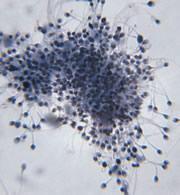 One in every 300 men makes hardly any sperm.Getty
One in every 300 men makes hardly any sperm.GettyCloning might one day restore the fertility of men with severely low sperm counts, say researchers in the United States who have cloned mouse sperm and used it to create apparently healthy adult mice.
Embryologists at Cornell University's Weill Medical College in New York cloned the sperm using similar methods to those used to clone whole animals, most famously Dolly the sheep.
They are hoping to clone human sperm within five years. If the technique works in humans, it could offer a lifeline to the roughly 1 in 300 men who are rendered effectively infertile by sperm counts approaching zero.
"If we can find just three or four sperm in a sample, we could grow them up," says Gianpiero Palermo, who led the research with his colleague Takumi Takeuchi.
Far from perfect
Palermo and Takeuchi cloned mouse sperm by injecting the heads of sperm cells into eggs that had had their DNA removed. The resulting 'pseudosperm' began to replicate, producing a cluster of cells all containing the same genetic material as the original sperm.
The researchers then fertilized intact mouse eggs with these cells, using a method called intracytoplasmic sperm injection. Already used in human in vitro fertilization, this involves using a fine needle to inject the sperm into the egg.
The resulting embryos were transferred to the wombs of female mice for gestation. So far, 13 mice have been born using the method, of which four survived to adulthood and produced offspring of their own.
The technique is a long way from perfect, Palermo and Takeuchi admit. The researchers implanted more than 80 embryos, and of those that did survive to full term, several died soon after birth.
It is not clear whether the technique would work for human sperm, in which cell division is more complex. Palermo estimates that each sperm could yield no more than eight clones, because allowing the cells to replicate more than three times could mean that the sperm DNA stops expressing male-specific genes.
And the cloned sperm are spherical. Lacking the tails that normal sperm use to swim, they are suitable only for test-tube fertilization.
Legal hurdle
ADVERTISEMENT
In many countries, the technique would also require changes to the law. In Britain, regarded as leading the way on embryological regulations, it is illegal to implant any embryo created using novel research techniques into a woman's womb. Embryos created using cloned sperm would presumably fall into this category.
Nevertheless, Palermo hopes that, as well as helping infertile men to become fathers, studying cloned sperm could help diagnose the cause of low sperm counts. "We can use the process to work out what exactly is wrong with the sperm," Palermo says.
Visit our bornfromclonedsperm.html">newsblog to read and post comments about this story.
